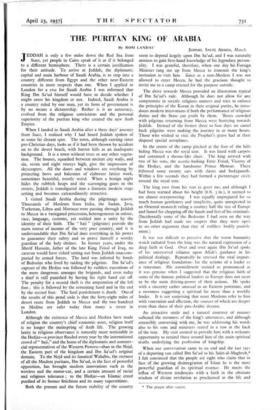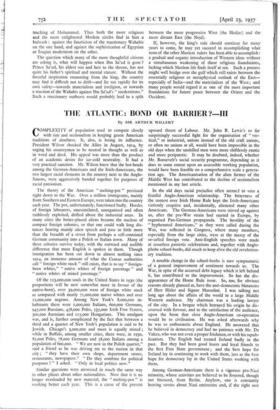_THE PURITAN KING OF ARABIA
By ROM LANDAU
JEDDAH, SAUDI. ARABIA, March.
When. I landed in Saudi Arabia after a three days' journey from Suez, I realised why I had heard Jeddah spoken of as some far distant spot. The town, although existing since pre-Christian days, looks as if it had been thrown by accident on to the desert beach, with barren hills as an inadequate background. It is a town without trees or any other vegeta- tion. The houses, squashed between ancient city walls, and six, seven and eight storeys high, give the impression of skyscrapers. All the doors and windows are overhung by projecting bows and balconies of elaborate lattice work, sometimes beautiful, mostly weird. When a benign night hides the rubbish heaps and the scavenging goats in the streets, Jeddah is transfigured into a fantastic modern stage setting and becomes extraordinarily attractive.
I visited Saudi Arabia during the pilgrimage season. Thousands of Moslems from India, the Sudan, Java, Turkestan,' Libya and Morocco were passing through Jeddah to Mecca in a variegated procession, heterogeneous in colour, race, language, customs, yet welded into a unity by the identity of their faith. The "haji " (pilgrims) provide the main source of income of the very poor country, and it is understandable that Ibn Sa'ud does everything in his power to guarantee their safety and to prove himself a worthy guardian of the holy shrines. In former years, under the Sherif Hussein, father of the late King Feisal of Iraq, no caravan would have risked setting out from Jeddah unaccom- panied by armed forces. The land was infested by bands of Bedouins who lived by raiding the pilgrims. Ibn Sa'ud's capture of the Hedjaz was followed by ruthless executions of the more dangerous amongst the brigands, and even today a thief is still punished by having his right hand cut off. The penalty for a second theft is the amputation of the left foot ; this is followed by the remaining hand and in the end by the second foot. The final punishment is death. One of the results of this penal code is that the forty-eight miles of desert route from Jeddah to Mecca and the two hundred to Medina are safer today than many a street in London.
- Although the existence of Mecca and Medina have made of religion the country's chief economic asset, religion itself is no longer the mainspring of Arab life. The growing laxity in religious observance is naturally more noticeable in the Hedjaz—a province flooded every year by the international crowd of " haji," and the home of the diplomatic and commer- cial representatives of the Western Powers—than in the Nejd, the Eastern part of the kingdom and Ibn Sa'ud's original domain. To the Nejd and its fanatical Wahabis, the sternest of all the Moslem puritans, Ibn Sa'ud, in the face of powerful opposition, has brought modem innovations such as the wireless and the motor-car, and a certain amount of racial and religious tolerance ; to the Hedjaz—an Islamic creed purified of its former fetichism and its many superstitions.
Both the present and the future stability of the country seem to depend largely upon Ibn Sa'ud, and I was naturally anxious to gain first-hand knowledge of his legendary person- ality. I was grateful, therefore, when one day his Foreign Minister rang me up from Mecca to transmit the king's invitation to visit him. Since as a non-Moslem I was not allowed to enter Mecca, he had the gracious thought to invite me to a camp erected for the purpose outside.
The drive towards Mecca provided an illustration typical of Ibn Sa'ud's rule. Although he does not allow for any compromise in strictly religious matters and tries to enforce the principles of the Koran in their original purity, he intro- duces modern innovations if both the performance of religious duties and the State can profit by them. 'Buses crowded with pilgrims returning from Mecca were hurrying towards Jeddah. Instead of the former three to four days on camel back pilgrims were making the journey in as many hours. Those who wished to visit the Prophet's grave had at their disposal special aeroplanes.
In the centre of the camp pitched at the foot of the hills hiding Mecca was the royal tent. It was lined with carpets and contained a throne-like chair. The king arrived with two of his sons, the ascetic-looking Emir Feisal, Viceroy of the Hedjaz, and the handsome Prince Monsur. There followed some twenty cars with slaves and bodyguards. Within a few seconds they had formed a picturesque circle around the royal tent.
The king rose from his scat to greet me, and although I had been warned about his height (6 ft. 5 in.), it seemed to me almost overpowering. I was equally unprepared for so much human gentleness and simplicity, quite unexpected in an Oriental monarch ruling a country half the size of Europe and famed for chopping off the hands and feet of his criminals. (Incidentally some of the Bedouins I had seen on the way from Jeddah had made me suspect that they were open to no other argument than that of ruthless bodily punish- ment.) It was not difficult to perceive that the warm humanity wnich radiated from the king was the natural expression of a deep faith in God. Over and over again Ibn Sa'ud spoke of his unreserved reliance upon Allah's guidance in his political dealings. Repeatedly he stressed the vital import- ance of religious foundations for the actions of a leader or a statesman. His astonishment seemed as pronounced as it was genuine when I suggested that the religious faith of some of the famous political leaders in Europe does not seem to be the main driving-power of their actions. He spoke with a sincerity rather unusual in an Eastern potentate, and a sternness suggesting a spiritual far more than a worldly leader. It is not surprising that most Moslems refer to him with veneration and affection, the sources of which are deeper even than those of their pan-Arabic dreams.
An attractive smile and a natural courtesy of manner softened the sternness of the king's utterances, and although ostensibly conversing with me, he was addressing his words also to his sons and ministers seated in a row at the back of the tent. My visit seemed to provide him with a welcome opportunity to remind those around him of the main spiritual truths underlying the profession of kingship.
When our conversation came to an end and the last rays of a departing sun called Ibn Sa'ud to his Salat-al-Maghreb,* I felt convinced that the people are right who claim that in face of the growing disintegration of Islam he is the most powerful guardian of its spiritual essence. He meets the influx of Western tendencies with a faith in the ultimate wisdom of divine revelation as proclaimed in the life and
* The prayer after sunset.
teaching of Mohammed. Thus both the more religious and the more enlightened Moslem circles find in 'him a bulwark : against the fanaticism of the reactionary Wahabis on the one hand, and against the sophistication of Egyptian or Iraqian modernism on the other.
The question which many of the more thoughtful citizens are asking is, what will happen when Ibn Sa'ud is gone ? Prince Sa'ud, his eldest son and heir to the throne, has not quite his father's spiritual and mental stature. Without the forceful inspiration emanating from the king, the country may find it difficult not to drift—and far too rapidly for its own safety—towards materialism and irreligion, or towards a reaction of the Wahabis against Ibn Sa'ud's " modernisms." Such a reactionary outburst would probably lead to a split between the more progressive West (the Hedjaz) and the more distant East (the Nejd).
If, however, the king's rule should continue for many years to come, he may yet succeed in accomplishing what none of the other Moslem rulers has been able to accomplish : a gradual and organic introduction of Western ideas without a simultaneous weakening of those religious foundations, lacking which Moslem life finds itself at sea. Such a proces might well bridge over the gulf which still exists between the essentially religious or metaphysical outlook of the East— especially of India—and the materialism of the West; and many people would regard it as one of the most important foundations for future peace between the Orient and the Occident.











































 Previous page
Previous page